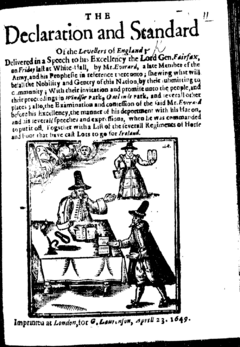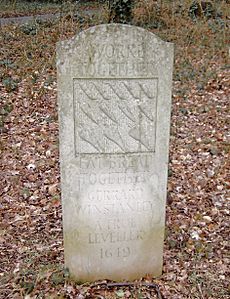Diggers facts for kids
Quick facts for kids
True Levellers
|
|
|---|---|

Woodcut from a Levellers document by William Everard
|
|
| Leader | Gerrard Winstanley |
| Founded | 1649 |
| Dissolved | 1651 |
| Split from | Levellers |
| Ideology | Agrarianism Utopian socialism Radicalism Republicanism Universal suffrage Populism |
| Political position | Left-wing |
| Religion | Dissenter Protestantism |
The Diggers were a special group of people in England who lived a long time ago. They had strong ideas about how society should work. They believed that land should be shared by everyone, not owned by just a few people.
They were also known as True Levellers in 1649. This name helped tell them apart from another group called the Levellers. The Diggers got their name because they tried to farm on common land, which was land that wasn't owned by anyone and could be used by everyone. Because of their beliefs and actions, the Diggers often faced problems and were forced to move from place to place.
The Diggers wanted to change society by living a simple farming life. They aimed to create small, fair communities where everyone was equal. Their idea of sharing everything came from an old Bible story. It described a group of believers who shared "all things in common" instead of owning personal property.
Contents
What the Diggers Believed
In 1649, a leader named Gerrard Winstanley and 14 other people wrote a paper called The True Levellers Standard Advanced. In this paper, they called themselves "True Levellers." This was to show how their ideas were different from the original Levellers.
When they started to farm on common land, people began calling them "Diggers." Winstanley believed that true freedom meant people could get their food and support from the land. He thought that humans and nature were connected. The Diggers wanted to create a perfect community where everyone shared everything.
The True Levellers also thought that everyone should have access to healthcare. They believed in owning things together, not individually. They wanted to live by good moral values.
Where the Diggers Lived and Worked
St George's Hill, Weybridge
In April 1649, people heard that some individuals had started planting vegetables. They were working on common land at St George's Hill in Weybridge, Surrey. This was a time when food was expensive and harvests were poor.
The Diggers invited everyone to join them, promising food, drink, and clothes. They planned to remove all fences that blocked common land. They hoped thousands of people would join them within ten days. This was when they published their paper, The True Levellers Standard Advanced.
The Diggers faced many challenges. The local lord, Francis Drake, caused them a lot of trouble. He organized groups to attack the Diggers, beating them and even burning one of their shared houses. After a court case, where the Diggers were not allowed to speak for themselves, they were found guilty of certain accusations. To avoid the army being used against them, they left St George's Hill in August 1649.
Little Heath near Cobham
Some Diggers who left St George's Hill moved a short distance away. They went to Little Heath in Surrey. There, they farmed about 11 acres of land and built six houses. They harvested crops for the winter and wrote more papers about their ideas.
At first, the local leader, Parson John Platt, seemed to understand them. But soon, he became their main opponent. He used his power to stop local people from helping the Diggers. He also organized attacks on their property. By April 1650, Platt and other landowners managed to force the Diggers to leave Little Heath.
Wellingborough, Northamptonshire
Another Digger community started in Wellingborough, likely after meeting the Surrey Diggers. In March 1650, four Diggers from Surrey were arrested. They had a letter signed by Gerrard Winstanley. The letter encouraged people to start new Digger communities and to help the Surrey Diggers with money. These Diggers had traveled through many counties, spreading their message.
Iver, Buckinghamshire
A Digger community also formed in Iver, Buckinghamshire. This group was connected to the Surrey and Wellingborough Diggers. Their paper, "Declaration of the grounds and Reasons...", mentioned other Digger communities. These were in places like Barnet, Enfield, Dunstable, Bosworth, and other parts of England. The paper also said that after the Surrey community failed, the Diggers had to leave their children to be cared for by local funds.
How the Diggers Influenced Others
The Diggers' ideas have inspired people even centuries later.
- The San Francisco Diggers were a group in the 1960s. They were activists and actors in San Francisco. They gave out free food and helped their community.
- In 1999, on the 350th anniversary of the Diggers' actions, a group called The Land Is Ours held a rally. They then occupied land at St. George's Hill again, just like the original Diggers.
- Since 2011, annual festivals have been held in places like Wigan and Wellingborough to celebrate the Diggers.
- Groups like Bolton Diggers have started community food gardens and cafes. They use leftover food from supermarkets to help people. The Manchester Urban Diggers also follow the Diggers' ideas. They grow food and teach people about food independence.
Diggers in Books and Songs
The story of the Diggers has appeared in many creative works:
- "The World Turned Upside Down" is a famous song by Leon Rosselson from 1975. It tells the story of the Diggers on St. George's Hill. Many other artists have performed this song.
- Winstanley is a 1975 film about the Diggers. It was based on a novel called Comrade Jacob.
- The book As Meat Loves Salt by Maria McCann (2001) includes a fictional Digger community.
- Caryl Churchill's 1976 play Light Shining in Buckinghamshire is set during the English Civil War. It shows the rise and fall of the Diggers' ideas.
- In Charlie Kaufman's 2020 novel Antkind, the Diggers and Winstanley are mentioned. A character is given a Digger pamphlet to inspire them to fight against an unfair government.
Images for kids
-
Woodcut from a Levellers document by William Everard
 | Chris Smalls |
 | Fred Hampton |
 | Ralph Abernathy |



